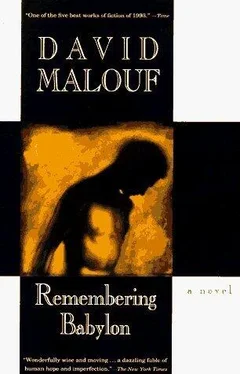Janet knew what she was doing, there was no mystery in it. But the scene, just the same, touched on something, just at the edge of thought, that she could not catch hold of. She would have liked to set the bowl down, relieve the ache in her arms, and concentrate on the spectacle and the slight disturbance it had set up in her, which was not at all unpleasant; but she could not risk it. Ants were already scurrying around her feet, engaged for the moment in hauling off dead bees, but alert already, the explorers among them, to what she carried. She had to use first one foot, then the other, to brush them off.
So she stood holding the bowl just yards from where Mrs Hutchence was working, with Meg, who was not sure about the bees, sheltering behind her; and in fact one or two of the most adventurous of them did come and settle on the crochet cover, and roll about there, and light at last on her hands. Mrs Hutchence, she thought, was singing; though it might have been the bees, which were exploding in separate points of light, then rushing together in clumps. The smoke reached their nostrils. Meg sneezed.
‘Goodness,’ Mrs Hutchence exclaimed, ‘who are you, child?’ seeing only one of them. She came forward. Bees were tumbling in the folds of her sleeves and dotted all the front of her veil. ‘Don’t be frightened.’
‘I’m not,’ Janet said. Her stiffness had to do with the way her arms ached from holding the bowl.
‘An’t you now.’
Mrs Hutchence gave her a hard look.
‘Well you needn’t be, either. The smoke makes ’em sleepy, you know,’ and she sent a little puff towards them.
‘Dear me, there are two of you.’
They came often after that, and were introduced to the house and its treasures, but for Janet the real attraction was Mrs Hutchence and the hives, which looked so closed and quiet under the trees but were filled with such fierce activity — another life, quite independent of their human one, but organised, purposeful, and involving so many complex rituals. She loved the way, while you were dealing with them, you had to submit yourself to their side of things.
Meg, on the other hand, was attracted to Leona. Janet too enjoyed the company of the kitchen table, with its games and teases, but it was the hives that drew her more. If she could escape, she thought, just for a moment, out of her personal mind into their communally single one, she would know at last what it was like to be an angel.
This thought belonged, yet did not, to what she thought of as her ‘visions’ but was more reliable than those, more down to earth. They had a worked-up quality to them; she worked them up out of herself . This came from outside and had begun when she saw Mrs Hutchence at work for the first time.
She associated her feelings at that moment with the ache in her arms, and with the bowl and its two covers, the one of fat, the other of crochet weighted with beads, which had kept her earthbound if she had been inclined to float; but mostly with the sound the bees made, the single vibrant word resounding in their furry heads, the way it gathered and magnified, so that she understood immediately not just what they were, in their individual bee bodies, but why they were; the flow of the honey and its making out of pollens gathered from all the surrounding country — the stringybark blossoms, the banksias, the eggs-and-bacon bushes they grazed on, the swamp-water they drank — to become the heavy scoop of gold in the bowl of a spoon, and the transparent thread from which, in its slow falling, it hung and did not fall.
She became Mrs Hutchence’s helper, with a sunbonnet and veil of her own, and soon was as expert, almost, as the older woman. But by then, the event had occurred that was to settle her in this business; and for life.
It was on a day not long after Gemmy had moved into the little room there, so she was no longer a beginner. They had finished their work with the bees. She had put off her bonnet and veil.
The day had been unusually oppressive, steamy, and for the last hour a dull sky had been glowering, bronze with a greenish edge to it, that bruised the sight. Suddenly there was the sound of a wind getting up in the grove, though she did not feel the touch of it, and before she could complete the breath she had taken, or expel it in a cry, the swarm was on her, thickening so fast about her that it was as if night had fallen, just like that, in a single cloud. She just had time to see her hands covered with plushy, alive fur gloves before her whole body crusted over and she was blazingly gathered into the single sound they made, the single mind.
Her own mind closed in her. She lost all sense of where her feet might be, or her dreamy wrists, or whether she was still standing, as she had been a moment before, in the shadowy grove, or had been lifted from the face of the earth.
The bees have their stomachs full, her mind told her, they will not sting. Stand still, stand still. It was her old mind that told her this.
She stood still as still and did not breathe. She surrendered herself.
You are our bride, her new and separate mind told her as it drummed and swayed above the earth. Ah, so that is it! They have smelled the sticky blood-flow. They think it is honey. It is.
Mrs Hutchence was only feet away. So was Gemmy. She could hear their voices calling to her through the din her body was making. But it made no difference, now, the distance, three feet or a thousand years, no difference at all; or whether she was a girl (a woman), or a tree. She stood sleeping. Upright. A bride. Then the bitterness of smoke came to her throat, and the cloud began to lift; and there, through the gaps in herself, was Mrs Hutchence with coils of smoke pouring out of her sleeves, and Gemmy, open-mouthed with a frame in his arms, and the bees, one by one, then in fistfulls, rolling off her, peeling away like a crust, till she stood in her own skin again, which was fresh where the air touched it, and only a few dozen foolish creatures were left that had got themselves caught and were butting with their furry heads and kicking, in a panic at being alone.
She felt Mrs Hutchence’s hands on her skin now, which was quite clear and unharmed but seemed new to her, and all through Mrs Hutchence’s fearful ministrations and Gemmy’s whimpering cries, she remained a little out of herself — half-sleeping, regretful, her two feet planted square on the earth.
Years later she would become expert beyond anything Mrs Hutchence might have dreamed of at the bee business. She would know all the breeds and crossbreeds, and create one or two new ones — actually bring them into being, whole swarms that the earth had never known till she called them. She would devote her life to these creatures, bringing to the daily practical study of their habits and all the facts and lore that is the long history of their interaction with men, a bodily excitement that went back to this moment, under the trees, when her mind had for a moment been their unbodied one and she had been drawn into the process and mystery of things.
For it was not the bees themselves that had claimed her; they had been only the little winged agents of it, the little furry-headed, armed angels that might, if she had panicked, have stung her to death, martyred her on the spot, a solid, silly giant that had stumbled in among them.
All that was still to come. For the moment, still numbed by the shock of what had struck her, she moved to comfort Mrs Hutchence, who had sunk to the ground, and sat like a rock gone suddenly soft, and sobbed and took a good while to get her breath.
‘Don’t be upset Mrs Hutchence,’ she said, feeling the older by years, though her voice was unchanged. ‘The bees didn’t hurt me, I knew they wouldn’t. I remembered what you told me and it was true. They didn’t sting.’
Читать дальше












